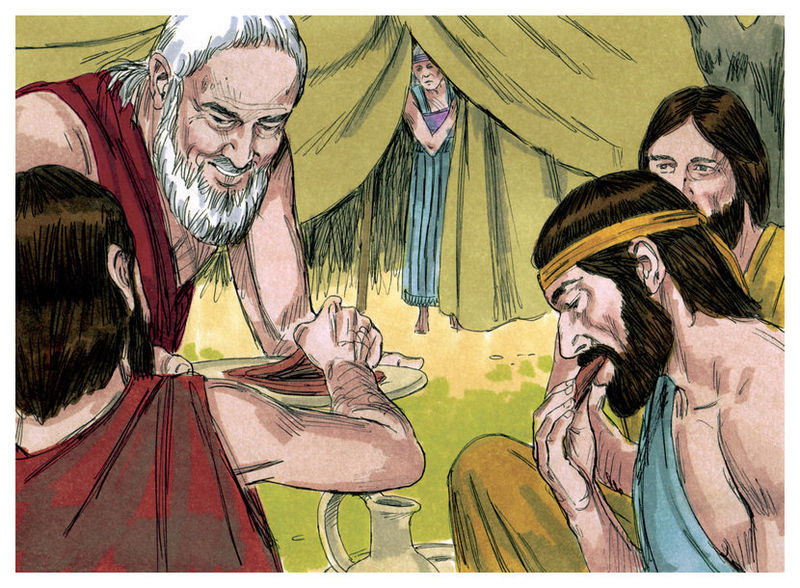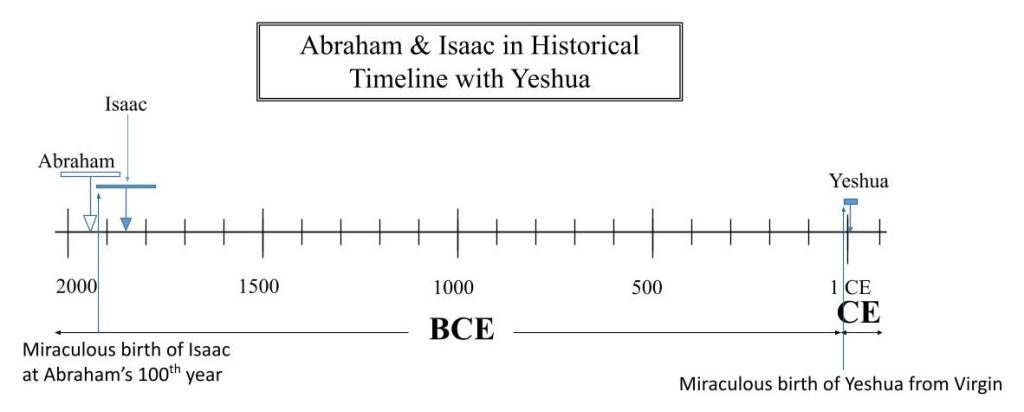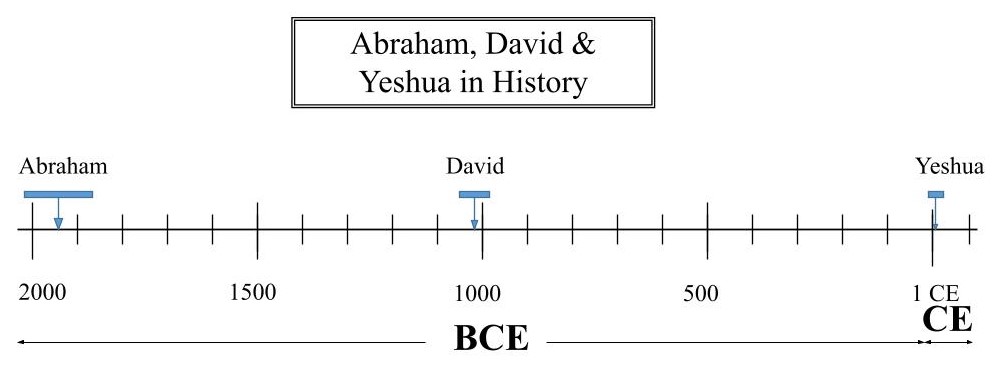Isaac’s (or Yitzhak, Itzhak) birth is one of the most anticipated and drawn out events in the Tanakh (Bible). G-d promised Abraham (Avraham), then 75 years old, a ‘great nation’ in Genesis 12. Obeying G-d’s promise Abraham left Mesopotamia for the Promised Land, making aliyah there a few months later.
But before Abraham (Avraham) could father ‘a great nation’ he needed a son, yet the promised son did not arrive. Abraham waited 10 years without siring any son or heir. But G-d reassured him with a binding oath, and trusting G-d, Abraham was ‘credited’ righteousness. Abraham did get Ishmael as a son, through a sort of surrogate arrangement, but G-d declared that Ishmael was not the promised son.
So the years passed with Abraham and Sarah continuing to wait, getting older with their prospects for a child fading to nothing over the years. Then finally, when Abraham was ninety-nine years old, he had this encounter.
The Lord appears to Abraham (Avraham)
The Lord appeared to Abraham near the great trees of Mamre while he was sitting at the entrance to his tent in the heat of the day. 2 Abraham looked up and saw three men standing nearby. When he saw them, he hurried from the entrance of his tent to meet them and bowed low to the ground.
3 He said, “If I have found favor in your eyes, my lord, do not pass your servant by. 4 Let a little water be brought, and then you may all wash your feet and rest under this tree. 5 Let me get you something to eat, so you can be refreshed and then go on your way—now that you have come to your servant.”
“Very well,” they answered, “do as you say.”
6 So Abraham hurried into the tent to Sarah. “Quick,” he said, “get three seahs of the finest flour and knead it and bake some bread.”
7 Then he ran to the herd and selected a choice, tender calf and gave it to a servant, who hurried to prepare it. 8 He then brought some curds and milk and the calf that had been prepared, and set these before them. While they ate, he stood near them under a tree.

G-d’s Promise for a son
9 “Where is your wife Sarah?” they asked him.
“There, in the tent,” he said.
10 Then one of them said, “I will surely return to you about this time next year, and Sarah your wife will have a son.”
Now Sarah was listening at the entrance to the tent, which was behind him. 11 Abraham and Sarah were already very old, and Sarah was past the age of childbearing. 12 So Sarah laughed to herself as she thought, “After I am worn out and my lord is old, will I now have this pleasure?”
13 Then the Lord said to Abraham, “Why did Sarah laugh and say, ‘Will I really have a child, now that I am old?’ 14 Is anything too hard for the Lord? I will return to you at the appointed time next year, and Sarah will have a son.”
15 Sarah was afraid, so she lied and said, “I did not laugh.”
But he said, “Yes, you did laugh.”
Genesis 18:1-15
Can we blame Sarah for laughing? Having a child when the father is 99 and the mother is 90 is sheer impossibility. We would have likewise laughed.
The Birth of Isaac (Yitzhak)
But next year we find that
1 Now the Lord was gracious to Sarah as he had said, and the Lord did for Sarah what he had promised. 2 Sarah became pregnant and bore a son to Abraham in his old age, at the very time God had promised him. 3 Abraham gave the name Isaac to the son Sarah bore him. 4 When his son Isaac was eight days old, Abraham circumcised him, as God commanded him. 5 Abraham was a hundred years old when his son Isaac was born to him.
6 Sarah said, “God has brought me laughter, and everyone who hears about this will laugh with me.” 7 And she added, “Who would have said to Abraham that Sarah would nurse children? Yet I have borne him a son in his old age.”
Genesis 21:1-7
So Abraham (Avraham) and Sarah now have their promised son – Isaac (Yitzhak). Their dreams rekindle. But the overall account raises an important question.
Why the drawn out wait for Isaac’s (Yitzhak’s) birth?
Why does G-d wait 25 years from His first promise (Genesis 12) to bringing about the birth of Isaac (Genesis 21)? If G-d can do anything, and has power to do it instantly, why not bring Isaac about right away? Would that not better show His power? Or was there some special foresight to G-d’s roundabout way of doing things?
From later outcomes we can deduce several reasons for the wait. First, Abraham (Avraham) learned valuable lessons on trusting G-d in the long wait. In doing so he becomes a model for all who desire to trust Him. Those who would know G-d must follow Abraham’s path.
Second, instead of diminishing His power, the account magnifies G-d’s power. It is remarkable perhaps, but not miraculous, for a middle-aged couple to have a child. Unlikely events do occur naturally. If Abraham and Sarah had Isaac immediately we could interpret the account that way. However, for a couple at 100 years of age to have a child, it is either a fabricated story or it is miraculous. There is no other explanation, no middle ground. Either it did not happen as recorded or it was a miracle. If miraculous, then the whole project, known as Israel, continuing even to this day, sits on the foundation of G-d’s miraculous power and His utterly trustworthy promises. In the birth of Isaac, all Jews following through history build on a miracle. And if the foundation is miraculous, then so is the structure built on it.
Isaac’s (Yitzhak’s) miraculous birth compared to Yeshua’s miraculous birth
Now for a little pattern recognition. Consider that Abraham (Avraham) had only one other descendant claiming an equally promised, anticipated and miraculous birth. This person was Yeshua (Jesus) of Nazareth. Jacob (Yaaqob), Samson and Samuel were born in barrenness it is true, but not of the type requiring a miracle as Isaac’s birth did. Moses’ (Moshe’s) survival was extraordinary, but not his conception.
For preceding centuries, in various ways and through different prophets, G-d made promises that the Messiah would come. The Brit Chadasha then present Yeshua as this promised Messiah. His being born from a virgin is equally, if not more, miraculous than Isaac’s birth. Exactly as with Isaac’s birth narrative, we can only interpret the virgin birth of Yeshua as either fabricated story or the miraculous. There is no other explanation, no middle ground. A little reflection brings plainly into sight this symmetry between the births of Yeshua and Yitzhak.

Yeshua as Archetype of Israel
This is one instance in the overall portrait of Yeshua as the archetype of Israel. As an archetype he represents, fulfills and is the fulfillment of G-d’s purposes first uttered to Abraham (Avraham) 4000 years ago. To be an archetype Yeshua’s birth had to pattern that of Isaac (Yitzhak), the first of the nation. Otherwise Yeshua’s claim to be Israel is proved false right from the start. But since the miraculous nature of both their births match, then his claim to be Israel remains, at the very least, an open question worth investigating.

From this perspective, Isaac’s birth foresaw that of Yeshua who would come almost 2000 years later. We see this foresight when we look back in hindsight to compare their births. To coordinate with foresight like this across such an immense span of human history supports Yeshua’s claim that He is the cornerstone of a Divine project. He invites us to understand this project so that we can be beneficiaries of that original promise given to Abraham so long ago.
… all peoples on earth will be blessed through you
Genesis 12:3
We continue looking at Yeshua from this vantage point, examining his person and life through his Jewish lens. We continue by looking at how Herod pursued him to take his life, also rather commonly experienced by the Jewish nation, exemplified in Anne Frank’s story.